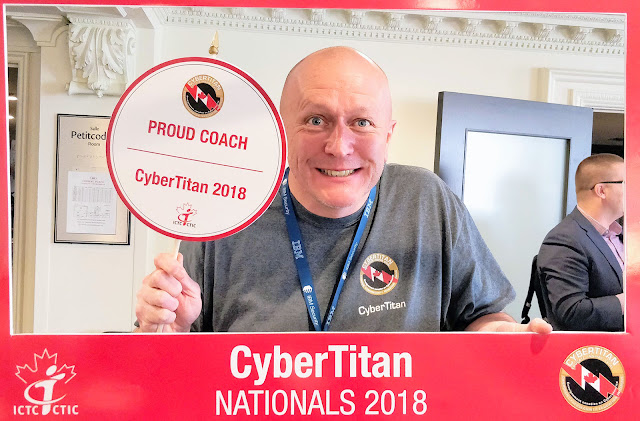Michael Enright is interviewing 4 “new” teachers on Sunday Edition today (though I’m not sure a year 7 teacher qualifies as new). Here are the questions he asked these bright and shiny teachers from across Canada. Once he settled them in, the discussion got real!
Being an interrogative, tarnished, unpicked teacher, I thought I’d throw in my two cents too! Feel free to grab the questions and reply for yourself below…
Why did you become a teacher?
I got downsized 3 times in business, and started to get the sense that you’ll get used and tossed by business no matter how hard you work at it. You’ll put in years above and beyond and get chucked when it suits them. I’d taught in Japan for a couple of years and my wife was a teacher. When the last downsize happened she encouraged me to go take teacher’s college in Ontario. I didn’t like school, didn’t do particularly well at it, and still think it’s a bit of a holding cell for disenfranchised young citizens (if the voting age was changed to 16, graduation age would quickly follow it).
I’ve learned in many different environments from classrooms to online to machine shops. In my experience classrooms tend to be more about control than learning. Every year before I go back into the classroom I listen to Another Brick In The Wall, and then promise never to do that to anyone. It’s very easy for education to become a mechanical system.
I love learning, and I see my students as people, not statistics. I loved being Sensei in Japan, being ‘teacher’ in Canada isn’t quite as renowned, but I’m dedicated to my professional practice and believe that what I do matters.
Are you a minority in your field (gender? race? age?) What’s that like?
I was the oldest in my teacher training program by many years. Most of my colleagues were career eductionalists (public school straight into university straight into teacher’s college straight into teaching). I often found myself applying experience to what was a challenging teaching program while the pro-students choked on the work loads.
I’ve often found it difficult to see eye to eye with how academic teachers do things. But one of the most important things about teachers is that they represent all aspects of society. If the only teachers students met were academic A+ average robots, many students would be alienated. It’s important that we have a diverse teaching population for a diverse student population. Mentors aren’t found in ranks of similar people.
Has being a teacher changed you?
I’ve really enjoyed building a profession knowing that I can commit myself to it and not get dumped because of a spreadsheet. That sense of security allows me to do an important job well. It allows me to justify the thousands of dollars I’ve spent on my own qualifications without fear that it may be wasted. Teaching is a long view profession that I enjoy developing year after year.
There has been a lot of latitude in job options, so I’m never bored. Teaching hasn’t changed me much, but I’ve finally found a profession that matches my intensity. If it’s changed me at all, it’s made me a bit more reluctant to argue ideas (believe it or not), while I work out all sides of an issue. Teaching makes you less likely to jump to conclusions.
Regionally, what’s challenging about your job?
On the edge of rural and urban Canada, I have a great deal of difficulty dealing with students driving to school with large rebel flags in their pickup trucks. The overt racism can be shocking (though it tends to be repeated from the dinner table and is based more on a lack of experience than a sense of actual hatred). I enjoy taking as many students as possible on field trips to Toronto – it’s good for them, though many fear they will be murdered.
Anyone spread too thin by teaching?
I tend to jump into breaches, suddenly find myself teaching pilot programs, heading departments, running sports and clubs, presenting at conferences, representing in the union… often all at the same time. My wife teaches too, and between us I feel a great deal of tension wanting to participate in the full spectrum of teaching related work and keeping up with family commitments.
One of the hardest things I’ve found in teaching (I’m going into year 9) is the gearing. You go at 110% all semester and then suddenly it’s exams. In June it then means summer. The change in gears is stressful, it’s hard to put it down, and it gets awfully heavy if you don’t.
I’ve had half a dozen distinct careers… none have been remotely as emotionally, physically and intellectually exhausting as teaching. If you’re at work, you’re full on, all the time. There are no easy days when you feel like taking it slow. If you’re away, you’re still planning all the work, so you’re never really off. When you are there, you’re surrounded by people, an unfortunate percentage of whom are of questionable personal hygiene. You get sick a lot. You make your family sick a lot. All while going 100%, all the time.
Are we asking teachers to do too much?
 |
| http://www.torontosun.com/2012/08/16/broten-tackles-teacher-pay “no average Ontarian would expect a 5.5% pay hike in these economic times, just because they took the summer off and refused to negotiate”
|
If their bosses are going to publicly humiliate them and ignore the actual job in favor of public illusions about the profession, then yes, we are asking teachers to do too much without recognizing what the job actually is. I have been teaching for 8 years and have yet to have a ‘summer off’. I know some teachers do walk away and do nothing, but many more don’t. If you’re going to represent a profession by their worst members, no job in the world is going to look appealing. Teachers don’t mind doing the extra work, they tend to do it for the right reasons (passion), but not if it’s going to be used against them, which it has been.
How do you deal with the bureaucracy?
Cautiously, especially now that I understand I work for a ministry that is run by morally bankrupt vote grabbers who stand for nothing and are willing to toss any ideal they claim to represent into the fire if they think it’ll satisfy the mob.
I’ve found my school admin to be relatively easy to work with. The vast majority are professional and dedicated to fair, reasonable work. I’m finding the larger, political structures to be somewhat less trustworthy.
What is the relationship between teachers and the ministry (bureaucracy)?
See above. No real problems until this year. We do our job very well, they support us, we look fantastic in UN rankings of world education systems. Apparently we can trash that if it means winning a single by-election. Now I am trying not to be hostile, though it is hard when your boss openly lies about you in the media.
Yes, going to school this year has been overshadowed by some very negative politics. The only thing I find more frustrating are head-in-the-sand teachers who refuse to acknowledge anything about it. It affects them, but they think they’re above it. How they can call themselves genuine when they are willfully ignorant of the hypocrisy hurting their profession is annoying. Meanwhile, they appear to be content letting other people throw themselves into a fight that will benefit them while they do nothing about it. I wonder how they teach students about democracies and human rights, it isn’t through example.
Do teachers drive students to do well in standardized testing? Is it a race?
I hate that they do, but they do. Test scores have dictated where I live, which makes me sad. Not all schools are created equally, and people grasp at anything to distinguish them. I’m an advocate of saving the millions we spend a year on testing by cancelling it. The only way we can get better is by NOT following bad US habits down the toilet. Simplifying learning into standardized testing is beneath the standard we’ve set for ourselves.
How do you handle parents with unreal expectations? or an abiding dislike of teachers?
The second bit I get a lot of around this very conservative (never been anything else) riding. As a general rule I try and deal directly with students, my covenant is with them. Having said that, I use technology to try and make my teaching as radically transparent as possible. If there are no surprises, there are usually no complaints.
I also approach teaching trying not to prejudice students. I’ve seen too many teachers gossip about a student and destroy any chance for them to build a new relationship with a different teacher. I’ve had very good relationships with students who have been nightmares for others. I try to avoid that kind of talk – it leads to confrontations with parents.
Even the most hateful parent won’t have a complaint if I’m straight up and direct with the student and them about what a course is and how to do well in it. The fact that I can talk to them from their own experiences (not just as an Ed-bot) doesn’t hurt either. It’s a lot easier to commiserate with someone who has been downsized when you’ve experienced it yourself. The shiny educationalist would find that challenging.
 |
| “You don’t know what it’s like out there, you’ve never worked in the private sector, They expect results! (shudder)”. |
***
CLICK HERE to listen to the original interviews. As mentioned, once they get settled in and get past the bright, shiny stuff, it gets real!
***
Here are the questions boiled down. Feel free to copy and paste in to go face to face with Enright yourself!
Why did you become a teacher?
Are you a minority in your field (gender? race? age?) What’s that like?
Has being a teacher changed you?
Regionally, what’s challenging about your job?
Anyone else spread too thin by teaching?
Are we asking teachers to do too much?
How do you deal with the bureaucracy?
What is the relationship between teachers and the ministry?
Do teachers drive students to do well in standardized testing? Is it a race?
How do you handle parents with unreal expectations? or an abiding dislike of teachers?






















